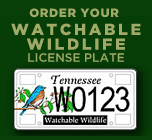The problem of nuisance Great Blue Herons eating fish from decorative koi ponds and gardens is common.
While there is no sure-fire way to prevent fish loss to predators, here is a list of measure you might want to try.
-Make at least part of your pond over 3 feet deep. That is too deep for herons to walk and will give the fish a place to hide.
-Submerge a structure in the pond, like a trash can, for fish to hide in.
-Put a statue of a heron by the pond. Herons are territorial and will not come around if they think the fishing hole has been taken.
-Put a net over your pond. It will keep out falling leaves as well as predators.
-Purchase a motion sensate sprinkler to discourage herons.
For more information see link below or contact your local Animal Damage Control expert with the Wildlife Services branch of the US Department of Agriculture.
Other sources: Watergarden.org
There are also many companies authorized to capture pest mammals, i.e. raccoons, squirrels, opossums, etc., however no company is legally allowed to trap, remove, injure, or kill any species of bird native to North America. Species that are not protected by state and federal laws in Tennessee include European Starling, House Sparrow (English Sparrow), Rock Pigeon or Rock Dove, Eurasian Collared-Dove, Ring-necked Phesants and other released game birds not native to Tennessee, Muscovy Ducks, Mute Swan, Chinese Geese and other domestic farm geese.

















